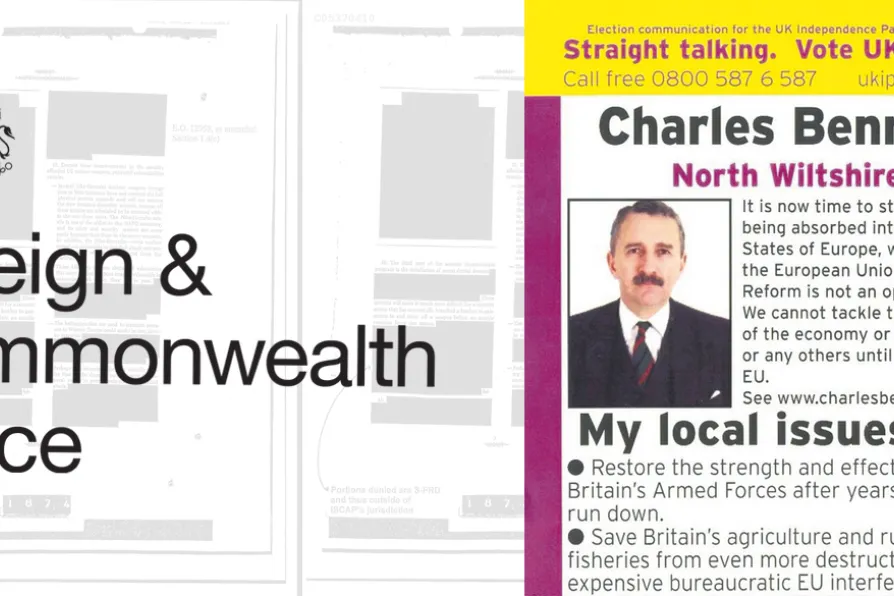
 Former Ukip parliamentary candidate Charles Bennet (right) is now employed by the Foreign Office to censor diplomatic telegrams
Former Ukip parliamentary candidate Charles Bennet (right) is now employed by the Foreign Office to censor diplomatic telegrams
THE Foreign Office has employed a former Ukip parliamentary candidate to censor sensitive diplomatic telegrams before they are made public, the Morning Star can exclusively reveal today.
The revelation comes as new figures show over 5,000 British government documents were blocked from release at the National Archives last year.
Among the censors is Charles Bennett, a former Ukip candidate whose LinkedIn profile says he started working as a “sensitivity reviewer” for the Foreign Office in September 2018.
In his Civil Service role he is paid to vet classified diplomatic cables and redact any sensitive material before such files are transferred to the National Archives under the 30-year rule.
The job is normally reserved for recently retired senior diplomats and there is a multimillion-pound wage bill for the team of around 44 censors.
Although Mr Bennett has no diplomatic experience, he describes himself as an “international affairs and security specialist” and once worked as a researcher for a Tory MP.
In 2010 he stood as Ukip parliamentary candidate for North Wiltshire before running for West Oxfordshire District Council in 2014, when he received only 102 votes out of almost 1,500.
Mr Bennett says his Ukip membership ended in 2015 but Corruption Watch director Andrew Feinstein told the Star the situation was still “outrageous.”
He said: “Someone who shares Ukip’s world view should not have any role in censoring what does and doesn’t appear in the archives.
“With this background how can he be the judge of what is in the public interest and should appear in the National Archives, the most important source for the majority of research in this country?”
Mr Bennett has retweeted scores of stories about Muslim grooming gangs but denies holding any prejudices against Islam.
He told one Twitter user: “Before someone starts the ‘racist/Islamaphobic’ [sic] mudslinging & sneering I have worked with many Muslims in Africa, Iraq, & Afghanistan & have owed my life to them, & have many Muslim friends here & abroad.
“This is specifically a problem with some British Muslims, NOT all of them!”
An FCO spokesperson said: “All Sensitivity Reviewers are civil servants and are bound by the values and standards of behaviour established in the Civil Service Code, delivering their responsibilities impartially and with integrity. They are all also subject to stringent security checks.
“Sensitivity review of FCO records is quality assured through internal processes and The Advisory Council on National Records and Archives provides independent advice and scrutiny of FCO records management, including sensitivity review.”
COLOURFUL HISTORY
DURING a long and varied career spanning the globe, Mr Bennett has worked as a police officer, soldier, private security consultant and election observer.
After Britain formally renounced its claim to Zimbabwe in 1980 he spent several years working there as a police inspector.
He ran “internal security” courses and deployed police patrol units attached to the Zimbabwe National Army in Matabeleland up until July 1983.
This coincided with the so-called Gukurahundi massacres by Robert Mugabe’s forces against his opponents in Matabeleland in which thousands of civilians were slaughtered.
Mr Bennett claims he “left the police in Zimbabwe partly because of Gukurahundi” and says the incident was “brushed under the carpet” by Britain, which was an ally of Mugabe at the time.
But Mr Feinstein said he should be investigated to determine “his role with Mugabe’s internal security police at the time of the massacre in Matabeleland.”
The following year Mr Bennett rejoined the British army and served as an infantry officer in the Ulster Defence Regiment, the largest military unit in Northern Ireland, where he says he was “engaged in continuous anti-terrorist operations of all types.”
In 1990 he moved into private security and did “various work” for the Saudi Arabian ambassador in London.
Later he was a security guard at a diamond mine in Mbuji-Mayi, DR Congo, in the aftermath of a major civil war in 1997.
He was employed at the mine by Defence Systems Ltd which was taken over by Armor Group and then G4S.
He has also worked for mercenary outfits such as DynCorp and Control Risks.
His other postings include stints in Basra, southern Iraq, at the start of the British occupation in 2003 and later in Helmand province, Afghanistan.
Mr Bennett claims he is still available to work as a counter-insurgency consultant while acting as a censor for the Foreign Office.
HOW MANY FILES ARE CENSORED?
It is not known which material Mr Bennett has personally tried to block from publication since starting at Whitehall.
Figures released last week show that in 2018 the government wanted 5,843 files to be censored and said another 970 should never leave Whitehall at all.
The censorship applications are scrutinised by a supposedly independent panel at the National Archives. But it overturned just 17 of the requests, less than 0.0025 per cent.
If historians or journalists want to challenge censorship decisions they have to make a freedom of information request to this same panel.
Its annual report shows there were 440 FOI requests made last year but only one was accepted — the lowest level on record.

















